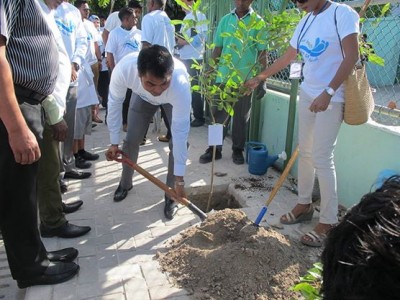A US$50 million contract for dredging and reclamation work in Hulhumalé has been awarded to Belgian company Dredging International NV, the Housing Development Corporation (HDC) has announced.
HDC revealed in a press release today that the letter of award to carry out the project was issued to the company yesterday (June 18) following discussions with the government.
“The project work will commence within a period of two months and the reclamation works is estimated to be completed within a period of seven months,” read the press release.
“It is estimated that the Hulhumalé Phase II reclamation and coastal protection work will be completed by the end of December 2015.”
Phase two of the Hulhumalé development project involves reclamation of 240 hectares of land “with a target population of 100,000 people,” HDC explained.
According to the corporation, development plans for the fully reclaimed artificial island includes residential developments, a business district and “commercial spine,” a light industrial park, a yacht maria and cruise terminal, a knowledge and technology park, a heritage island a tourism district.
“Both Hulhumalé Phase I & Phase II developments are planned in line with the government’s overall vision to bring sustainable youth related developments,” the press release noted.
HDC Managing Director Suhail Ahmed told local media this week that the government was seeking a loan from the Bank of Ceylon (BOC) to finance the second phase of the Hulhumalé development project.
Suhail said HDC was “going through the terms of the loan deal” and “assessing all conditions,” adding that the project would likely be state-financed.
“Youth village”
Phase two of the Hulhumalé development project was among five mega-projects pitched to international companies at an investor forum held last April in Singapore.
While the dredging project was “conditionally awarded” to Dredging International NV in July 2013, the company withdrew due to financial constraints.
According to the company’s website, Dredging International NV was established in 1974 and specialises in “the construction and development of harbours, artificial islands, estuarial dams, canals and inland waterways, dyke construction and reinforcement, beach replenishment and coastal protection, supply of dredged aggregates and salvage activities.”
Developing a ‘youth village’ in Hulhumalé with a population of 50,000 was a key campaign pledge of President Abdulla Yameen.
Speaking at an inauguration ceremony for a land reclamation project in Thulusdhoo last month, President Yameen said the government’s objective was to relocate people from small islands in the atolls to Hulhumalé.
Economic opportunities in small islands were limited due to their size and isolation, he added.
The government hoped youth from smaller islands would migrate to Hulhumalé as well as other islands selected for land reclamation, Yameen said.
In April, Yameen said the HDC’s development plans were being revised to achieve the new administration’s goals.
The vision for the youth city includes a “technopolis park” as well as entertainment and sports facilities, he said, in addition to facilities for the tourism and fisheries industries.
“The youth village will not involve only housing [projects]. It will also include other projects related to the youth village such as the creation of light industries to provide job opportunities, as well as arrangements for food and beverages required by modern youth and restaurant facilities for [fast food],” he said.
Yameen also revealed last month that the government planned to tender the the Malé–Hulhulé bridge project in early June.
“God willing, before the end of the first two weeks of June, we will tender the bridge project. With that, additional studies needed for the project – that is the direction and extent of ocean currents – will be undertaken by the party awarded the tender,” he explained.
In February, Economic Minister Mohamed Saeed pledged that the Malé–Hulhulé bridge project – which he described as “iconic for the whole region” – would be completed in two years.
Likes (0)Dislikes
(0)Dislikes (0)
(0) 
